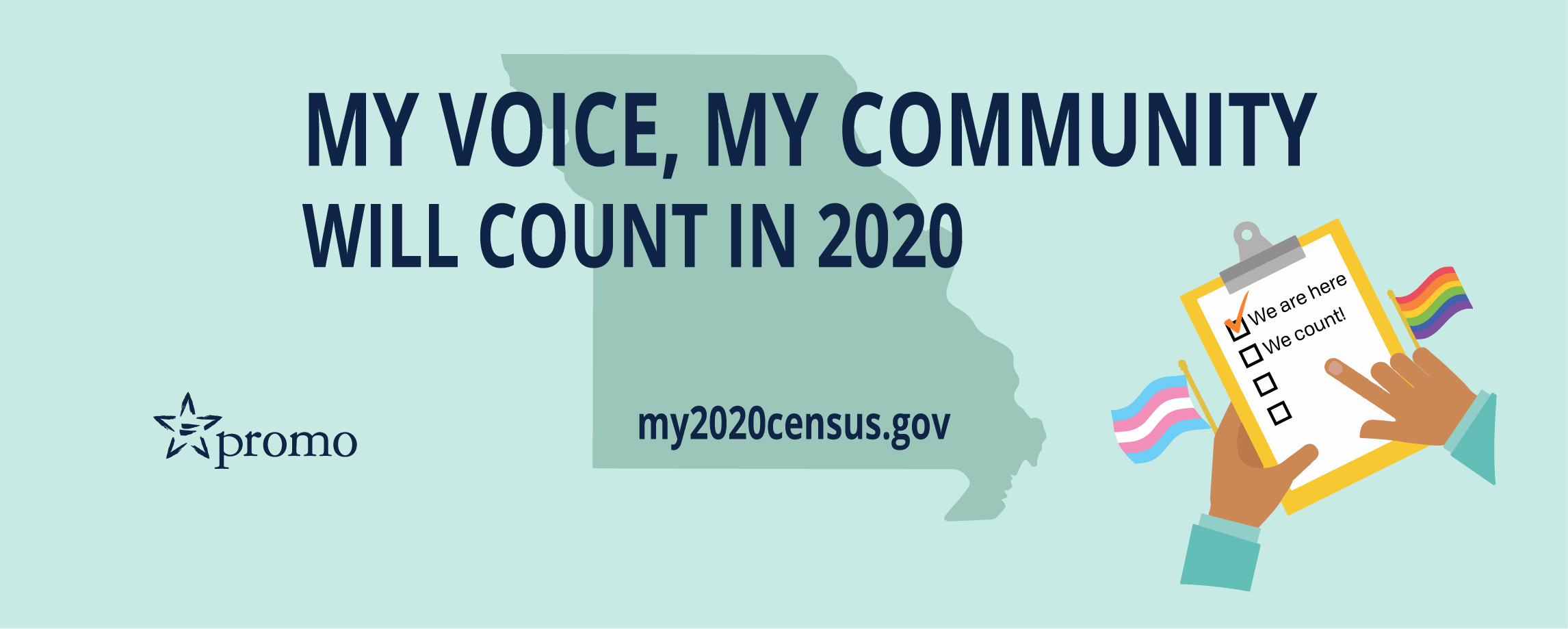The census is a complete count of every single person in the US. Census numbers determine funding and political power to our communities, and it’s a one-in-ten year chance to get the power our neighborhoods deserve.
So many important programs in Missouri are impacted by the census. Census numbers determine funding to health care, SNAP, roads and infrastructure, public housing, school breakfasts, Medicaid long-term care services are funded that can help more seniors stay in their homes and live with dignity as they age, and more. To get all the funds we deserve, we need an accurate count.
Though the Census does not explicitly ask about gender identity or sexual orientation, LGBTQ people exist within all frameworks of life that are represented in the census. To get all the funds we deserve – that our community needs – we must get an accurate count. That means it’s important that every LGBTQ Missourian counts in the census. That’s why it’s important for you to fill out the census, and to make sure your friends, family, and neighbors are counted, too.
- The self-response website is: my2020census.gov
- Toll Free Number: 844-330-2020
- Phone numbers in many languages
Important dates:
- As we are all facing stay-at-home obligations due to Coronavirus, the online date to complete the Census is now: July 31, 2020
- April 8-16: A reminder letter will be sent (4th mailing) with a paper Census to fill out and mail if you have not yet submitted the Census electronically
- May 28 – Aug 14: A Census representative will knock on your door for those who have not yet responded, please attempt to fill out the Census by phone, computer, or mail ASAP so we lessen person-to-person contact.
- September 30, last day to get counted!
Census notes:
- The U.S. Census Bureau will keep your information private. They are not allowed to share your information with anyone, including other government agencies.
-
The Bureau is prohibited from using Census survey results for any reason other than for statistical purposes. This means that your answers to the Census survey can’t legally be used for any type of immigration, housing, or other type of law enforcement. In fact, the Bureau has said, “We will never share a respondent’s personal information with immigration enforcement agencies, like ICE; law enforcement agencies, like the FBI or police; or allow it to be used to determine their eligibility for government benefits.
-
- Make sure you count everyone living in your house or apartment. It does not matter if they are not listed on the lease or rental agreement, or if they are not related to you. The U.S. Census Bureau cannot share your information with your landlord.
- A census worker will never ask for your Social Security number.
- A census worker will never ask for information about your bank accounts or credit cards.
- The U.S. Census Bureau will not email you about the 2020 Census. If you receive emails about the Census, its from organizations like PROMO or others you are part of.
Notes when filling out the census:
- PROMO understands that the census only asks if each person being counted is “male” or “female.” We understand that this is a challenge to answer for many in the transgender, gender non-binary, and LGBTQ community.
-
The Bureau respects how people self identify on the Census, and since it doesn’t crosscheck the information you provide on the survey with any other source, answer as best as you can with how you self-identify. Self-identify here in the way that feels most comfortable for you. If you do not fill out this answer, the Bureau will choose an answer for you.
-
- You cannot get in any legal trouble for self-identifying.
-
Census law indicates that anyone who “willfully gives any answer that is false” on the survey may be fined up to $500. This law is not intended to punish people who answer the questions in a way that better reflects who they are with regard to their name and sex, nor is it intended to enforce housing laws and policies. Instead, the point of this law is essentially to make sure that each household only submits one survey, which ensures that everyone is fairly and accurately counted.
-
What’s at risk if we don’t count:
- For every adult and every child that is not counted, our state will lose $1,300 in federal dollars every year. That adds up to $13,000 per person over the next 10 years. Those are funds that we won’t get for our roads and bridges, hospitals, and schools.
- In 2010, Missouri lost a seat in Congress because not everyone was counted. We can’t risk losing another voice for Missouri in Washington, D.C.


